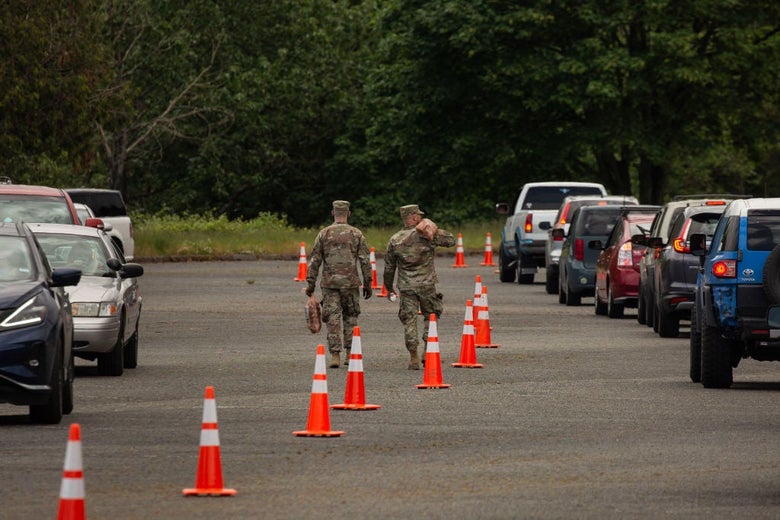
Members of Washington Air National Guard at a food giveaway event in Tacoma, Washington in May 14.
David Ryder/Getty Images
In 2017, Donald Trump signed something called the “Forever G.I. Bill” at his company’s golf course in Bedminster, New Jersey. The law expanded the educational benefits that had been made available under the “Post-9/11 G.I. Bill,” which was passed in 2008, and which supplemented various benefits that can be traced back to the original 1944 G.I. Bill. The White House would later tout the “Forever G.I. Bill” as an example of how Trump was “working tirelessly to provide the benefits and services that our veterans deserve.”
In late March, the Trump administration authorized the deployment of members of the National Guard to help local authorities conduct coronavirus tests, set up field hospitals, and perform other critical public-health tasks that carried a risk of infection. More than 40,000 service members have been deployed in total, but Politico now reports that they will all be recalled on June 24—one day before the first group sent into the field would reach the 90-day active-duty minimum that’s required to qualify for G.I. Bill education benefits and for a retirement benefit that was also created in 2008. Says the news site (the “official” is a FEMA staffer):
The official outlined the Trump administration’s plans on an interagency call on May 12, an audio version of which was obtained by POLITICO. The official also acknowledged during the call that the June 24 deadline means that thousands of members who first deployed in late March will find themselves with only 89 days of duty credit, one short of the 90-day threshold for qualifying for early retirement and education benefits under the Post-9/11 GI bill.
Specifically, members must be on active duty for more than 90 days to begin qualifying for help paying for tuition, fees, housing, and supplies at colleges, trade schools, and vocational training programs. Serving for 90 days on active duty also reduces the age at which they can retire with benefits by three months.
“We would greatly benefit from unified messaging regarding the conclusion of their services prior to hitting the 90-day mark and the retirement benefit implications associated with it,” Politico quotes the FEMA official as saying, though the article does not indicate whether he went on to elaborate about exactly what “message” would adequately address the feelings of a National Guard member who was asked to disinfect nursing homes during a pandemic for the precise number of days that would maximize her exposure to a deadly virus while minimizing the federal government’s subsequent obligation to help her get a college degree. The White House, needless to say, did not comment.
Readers like you make our work possible. Help us continue to provide the reporting, commentary, and criticism you won’t find anywhere else.
Join Slate Plusfrom Slate Magazine https://ift.tt/2LH9gr1
via IFTTT
沒有留言:
張貼留言